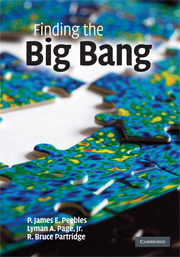4 - Recollections of the 1960s
Published online by Cambridge University Press: 05 July 2015
Summary
Our plan of ordering the essays is to group them by topic, with chronological order within groups. The grouping is by the focus of the research, as indicated by the section headers. Since this focus tends to evolve with time, the result is that these recollections of what happened are presented in a roughly chronological order. For example, in the second half of the 1960s a first order of business on the experimental side was the test of how the energy of the CMBR varies with wavelength, and on the theoretical side it was the exploration of ideas about what a significant departure from a thermal spectrum might mean. These continued to be pressing issues at the end of the 1960s, but there was increasing interest in the experimental search for departures from an exactly isotropic distribution of the radiation, and in the development of the theory of the departures from isotropy that might be expected to accompany the known departures from an exactly homogeneous distribution of the matter. Thus we present the essays whose main focus is the spectrum before those largely concerned with the anisotropy of the CMBR.
Since many of the essays do not fit the headers our plan required arbitrary and debatable decisions on ordering. This is a realistic illustration of what was happening in the 1960s, of course. The confusion extends to the recollections: the stories are not complete and they are not always even consistent with each other. The reader, therefore, must be prepared for a distinct change of style from the linear – but we hope efficient – history of ideas in the previous chapter to the chaos of the real world of science.
Precursor evidence from communications experiments
David C. Hogg: Early low-noise and related studies at Bell Laboratories, Holmdel, NJ
The US National Academy of Engineering cites Hogg's election to the Academy for his “contributions to the understanding of electromagnetic propagation at microwave frequencies through the atmosphere.” A native of saskatchewan, Hogg' current interest is the composition of music.
- Type
- Chapter
- Information
- Finding the Big Bang , pp. 69 - 407Publisher: Cambridge University PressPrint publication year: 2009



